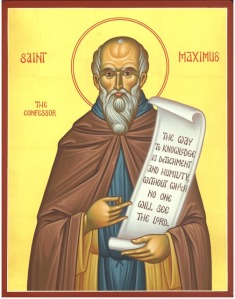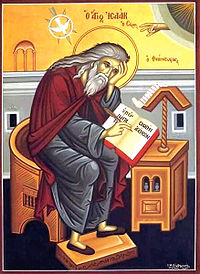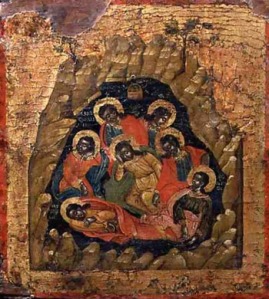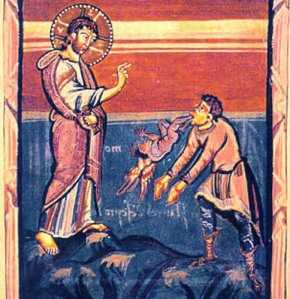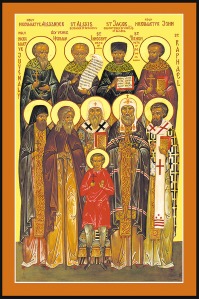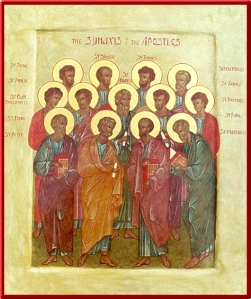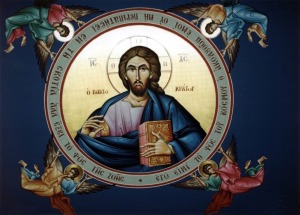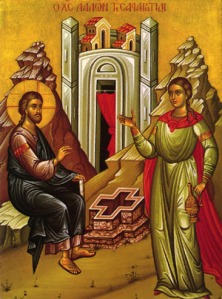“Generation of Vipers”: The Life and Ministry of St. John the Baptist
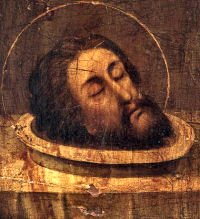 In the Name of the Father, and of the Son, and of the Holy Spirit, Amen. Christ is in our midst! He is and shall be!
In the Name of the Father, and of the Son, and of the Holy Spirit, Amen. Christ is in our midst! He is and shall be!
Today I’d actually like to talk about a Great Feast we celebrated this past week; on Thursday, we had the Feast of the Beheading of the Prophet, Forerunner, and Baptist of our Lord, St. John. Because of the reality of the weekday working situation in America today, most parishes aren’t able to really celebrate this Feast in the way it deserves. The highest level of Feast in the Church are those of Christ and the Mother of God, and this Feast of St. John is on the next highest level. We can see just from that, that this is a very special commemoration in the life of the Church.
Our Lord said of St. John that no greater man had ever been born of woman. He is the last and also the greatest of all of the Prophets of the Old Covenant. The Prophets were sent by God not primarily to predict the future (which is our modern understanding of prophet), but to reveal the deeper judgments of God. They came usually to call the people to repentance, and warn of God’s punishment if they failed to repent. [We still have this ministry, primarily within the bishops of the Church, who are here to reveal to us the deeper judgments of God – as we’ll pray in a few moments, “to rightly divide the word of Thy truth”] St. John is the greatest of the Prophets not only because of his fierce call of the people to repentance, but most especially because he was given the most sacred of all messages – to prepare for, and finally to announce, the coming of the Promised Messiah.
We don’t know an enormous amount about the early life of St. John. We first see him in the womb of his mother Elizabeth, and he leaps in her womb when the Theotokos comes to visit Elizabeth, pregnant with Jesus. The Fathers tell us that Elizabeth’s words to Mary are the voice of prophecy from John (the babe in her womb) – “Blessed art thou among women, and blessed is the fruit of thy womb. And whence is this to me, that the mother of my Lord should come to me? For, lo, as soon as the voice of thy salutation sounded in mine ears, the babe leaped in my womb for joy. And blessed is she that believed: for there shall be a performance of those things which were told her of the Lord” (Luke 142-45). We next find St. John preaching to the people of Israel, calling them to repentance and baptism in the Jordan River. All we really know about his life between his birth and his ministry is that his father, Zacharias, who was the high priest, was murdered in the temple. It is then believed that his mother Elizabeth took the baby John and fled to the wilderness, most likely living among the Essenes, who were a very strict and ascetical group of Jews that lived in the desert and were fed up with the degradation of the priesthood in the Temple of the Lord.
St. John was a rough man, per his description in the Bible – with long hair and a shaggy beard, dressed in camel skins for clothing, living in the desert and eating locusts and wild honey for his food. He had no fear of mankind – with strong words he called the people of Israel to repentance. He told them that they were sinners, and that they would suffer the wrath of God if they did not repent of their sins. He called them a generation of vipers, and even said that by their actions they had alienated themselves from Abraham, whom they called their father. He preached both to the average person and also to the leaders of the Temple; he even preached to the house of Herod the king. With his seemingly harsh words, as Fr. Zacharias very beautifully explains, with these harsh words (You generation of vipers) he consoled the people of Israel. He crushed the pride of their hearts by calling out their sins, and in their humbled state many repented, were baptized, and thus were consoled and saved. St. John baptized the people in the Jordan River as a sign of their repentance. This notion of being baptized was not foreign to the Jews; there is a rite of ritual purification that involves baptism; St. John merely used this in a new and inspired way.
We won’t go into great detail, but we can’t skip the great event of our Lord’s baptism by St. John. As John was preaching and baptizing one day, Christ appeared walking toward them. St. John had prophesied that one mightier than he was coming, the one who would baptize them with the Holy Spirit, and would be the judge of all mankind. When St. John saw our Lord approaching, he recognizes him and tells the people “here comes the one I’ve been telling you about, here comes the Messiah.” Jesus asks to be baptized of John; John instead asks to be baptized of our Lord, saying that there was no reason for Jesus to be baptized. And certainly, in the context of St. John’s ministry, calling the people to be baptized for the repentance of their sins, Jesus didn’t need baptism for this reason. Our Lord responds that His baptism is necessary to “fulfill all righteousness.” John immediately baptizes the Lord, and the Holy Spirit descends in the form of a dove, and the voice of the Father is heard from the heavens, “this is my beloved Son in Whom I am well pleased.” This baptism inaugurates the 3 year public ministry of the Lord as the Messiah.
The events leading up to the martyrdom of St. John come directly from his preaching to King Herod. He called the King to repentance, rebuking him because he had married his brother’s wife. This wife, Herodias, convinced Herod to arrest John. She wanted St. John dead, but Herod would not kill him because he knew that John was a holy man, a prophet, and so he protected him from death and even listened to him gladly, St. Mark says (6:20). But St. John remained in prison, even though Herod knew that he was a prophet. On his birthday that year, King Herod had a great feast of celebration, and his daughter Salome came and danced for the King and his guests, pleasing them greatly. Herod, swept up in the moment, promised to give the young girl anything she asked, up to half of his kingdom. Salome asked her mother what she should request of the king, and in her vengeance, the wicked Herodias told her to demand the head of St. John the Baptist on a silver platter. King Herod had no choice but to give the girl what she asked; St. John was beheaded and his head was delivered to Salome on a silver platter; the girl then delivered the martyr’s head to her mother. According to the Tradition of the Church, the head of the Forerunner continued to call Herodias to repentance. The frenzied Herodias repeatedly stabbed the tongue of the prophet with a needle and buried his holy head in an unclean place. His head was later recovered by a pious disciple, and buried on the Mount of Olives.
We very beautifully commemorate this martyrdom with a Great Feast on the 29th of August every year. We honor St. John’s ministry with a day of strict fasting, calling to remembrance our own sins and offering that same repentance to the Lord that he spent his ministry preaching.
Holy Prophet, Forerunner, and Baptizer of our Lord, pray to the merciful Saviour that our souls may be saved!
Glory to Jesus Christ! Glory forever!
Posted by Matthew Jackson
